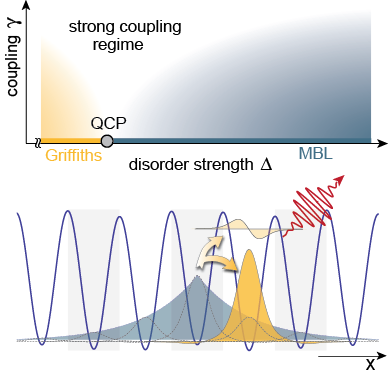
Submitted by Dr Ulrich Schneider on Wed, 22/03/2017 - 11:02
Our paper on Signatures of Many-Body Localization in a Controlled Open Quantum System has been published in PRX.
The behavior of an isolated quantum system follows one of two distinct paradigms. It can approach a thermal equilibrium state, where any initial quantum correlations spread throughout the system, rendering the system effectively classical. Alternatively, in the presence of disorder, a system can be what is known as “many-body localized” (MBL). This regime has recently received a lot of attention because here some quantum coherences remain local up to infinite times. However, experimental investigation of this novel state is complicated by unavoidable interference from the environment, which acts as a source of fluctuations (a “bath”) that eventually thermalizes the system. We have developed a method to implement a controllable bath and present a systematic study of its effects on a MBL system.
In our experiment, we illuminate a charge-density pattern in an ensemble of ultracold potassium atoms (the MBL system) with nearly resonant light, and we investigate the system’s response. Here, the light intensity controls the coupling to the bath, and the charge-density pattern decays as a stretched exponential with a linearly dependent rate. Furthermore, we find that the susceptibility of the MBL system to the photon bath strongly increases when approaching the MBL transition, which is analogous to the effects of finite temperatures in the vicinity of a quantum phase transition.
Using control over the bath, our study is a first step toward extrapolating the behavior of truly isolated MBL systems from experimental measurements. The method for implementing a controllable photon bath also has applications in a variety of experiments on cold atoms, both within and outside of the context of MBL.
Read the paper at (Open access): https://doi.org/10.1103/PhysRevX.7.011034
